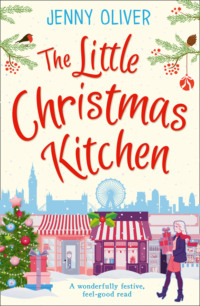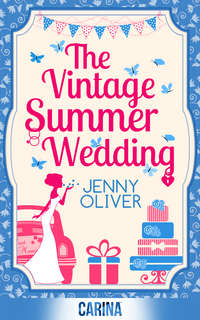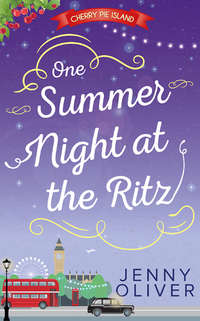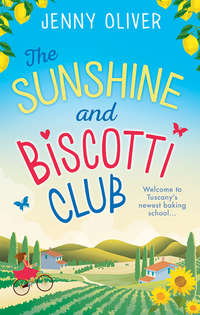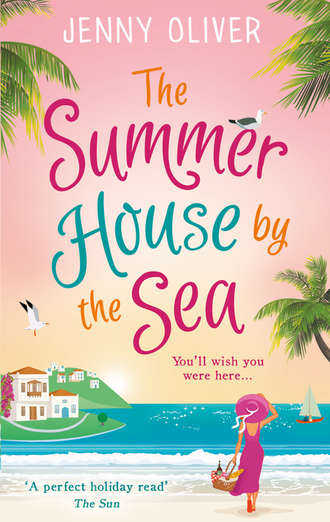
Полная версия
The Summerhouse by the Sea: The best selling perfect feel-good summer beach read!
Ava stared transfixed at the glass. Was her life something to be proud of? Had it really been lived as well as it could? If someone had stood at the lectern to speak, what would they have said about her?
Then, just as the haunting song was reaching its peak, Rory’s phone started to ring.
‘Oh man.’ Ava rolled her eyes.
‘Sorry!’ Rory held up his hand. ‘Sorry,’ he said, as he fumbled to turn it off.
Then the coffin lid shut. Ava blinked. The curtain drew around the glass and the reflection popped.
‘Are you alright?’ Rory nudged her on the arm.
‘Yes.’ Ava tucked her hair behind her ears. They followed as everyone in the room headed towards the door.
‘Sure?’ He narrowed his gaze.
She nodded, sliding her sunglasses down as they stepped out into the dazzling bright sunshine of the little Spanish town, a place familiar from holidays – a fifteen-minute drive from their grandmother’s beachside house – visited for the supermarket, the nightclub and a day trip whenever it rained.
The mass of people spewed out into the road, the noise in the air like starlings. And when the procession began it was like burying royalty. People came out of shops to nod their heads, stood in the doorways of the little tapas bars, leaned against the gnarled trunks of the orange trees to watch. The air was perfumed with the hint of late blossom and exhaust smoke, while the sun baked them all like an oven.
There was a band made up of three old guys with a trumpet, an accordion and a tambourine, led by the singer from the wake. The music and the chatting followed the coffin all the way to the cemetery, loud and lively, the wobbling mass of people like jelly through the streets.
All exactly to Valentina Brown’s specifications.
Ava allowed herself a moment of morbid self-absorption to imagine, had it been her, the rainy, grey afternoon, people shaking out their umbrellas and wrapping their black macs tight, complaining about the terrible summer they were having, her father standing quietly in the front pew while Rory gave the eulogy. She glanced at him surreptitiously checking his emails. Great.
At the cemetery the sun flickered through giant fir trees, welcome shade as the group paused in front of a big white wall of little black doors. Behind these niches were the coffins of the people in the gilt-framed, sun-bleached photographs screwed above each door. Faded artificial flowers and alabaster Virgin Marys watched mournfully over the proceedings as rays of sun dappled like fingers of dusty light.
Words were said in Spanish, a blessing Ava couldn’t understand. So she remembered instead her first taste of chorizo and chickpeas, and the sound of Padrón peppers sizzling in the pan, so incongruous in the little Ealing bungalow where her grandparents lived, the crazy-paved outside wall and the gnomes in the garden. Remembered the piping hot doughnutty churros and the pots of warm melted chocolate for breakfast that they ate in their sleeping bags in the front room on swirly brown carpet in front of the two-bar electric fire. And then summer holiday trips in the car, driving endless miles through France and across Spain to Mariposa, the beach town where Valentina Brown grew up. Home of the Summerhouse. Once a ramshackle fisherman’s hut – a place where their great-grandfather hauled his boats to store them for the winter and mend his nets – transformed into a little haven on the cusp of the sea by Eric Brown, Val’s husband, his pale English skin and dislike of sand keeping him happily indoors with his Black & Decker and PG Tips. Summer after summer the roof was tiled, the walls plastered, the bathroom and kitchen refitted, a little terrace added and a first-floor bedroom built into the wooden-beamed eaves. Ava remembered standing in the shade of the palm trees, handing her grandfather nails and spirit levels, while Rory mixed thick cement with a trowel and they both got told off for flicking each other with white paint. And as Eric carefully laid the pebbles for the front path, Ava wrote the words ‘Summerhouse’ in shells and a great discussion ensued as to whether there should have been a space between the words, Rory rolling his eyes at her stupidity and Val appearing to clip him round the ear before bending down and writing ‘Our’ in shells in the wet cement above.
It was the perfect summer hideaway. And when Eric passed away, Val decamped from Ealing to Mariposa full-time, and the Summerhouse became her everyday house. But for Ava and Rory it was still the place that holidays were made of.
‘She had a bloody good innings,’ Rory whispered as Val’s coffin was lifted.
Ava turned to look at him, snapped out of her memories. ‘It’s not a cricket match, Rory.’
He snorted under his breath. Ava looked away, out across the sea of mourners, to the hats and the white hair, the smiles, the open tears, the handkerchiefs, the cigarettes, the hipflasks, the veils and the bright pops of corsage colour.
She saw the fullness of a life take shape in the people come to mourn it and was struck by the single thought: I have been given a second chance.
She turned back to see the coffin carried towards its final resting place, waves of sunlight dancing on the carved wood while glitter-edged artificial flowers shone pink around the niche in the wall like a welcoming cocoon. And as the coffin slid inside the chamber, Ava reached up to wipe the first tear from her cheek.
CHAPTER 4
The little tapas bar was heaving with people, Barcelona warming up for the night. Ava and Rory had been dropped off by their taxi on the way from the cemetery to the airport after Ava persuaded Rory they had enough time for a quick drink. Rory had huffed, reluctant. He didn’t like leaving the airport to chance.
The evening sun was hovering on the cusp of the rooftops. Sparrows jumped in the dust. A guy in the square opposite the bar was playing the guitar, tapping his foot gently, a cap for change at his feet. Ava leant forwards on the little barrel table she was sitting at to watch. Behind the guitar player a couple on a bench were arguing, while across the square little children yelped and shouted on a climbing frame. The coloured lights strung between the plane trees glowed fairground bright.
‘Bloody hell, it’s carnage in here.’ Rory appeared, balancing little plates of tapas on top of two sherry glasses, elbows out like chicken wings from battling his way through the crowd. His phone was ringing. ‘Take these,’ he thrust the drinks at her as he fumbled for his phone. ‘I have to take this. It’s work.’
Ava sat for a second, sipping her sherry, then, with nothing else to do, checked her own phone. Before she’d flown to Spain she’d sent an email to her friends about a dinner next week, the subject line: I’m alive!! Everyone had immediately said they could come. But now her friend Louise, who was thirteen weeks pregnant, was asking for it to be postponed because the date clashed with a midwife appointment. Someone else had agreed, relieved because they had a work do they’d forgotten about; another cited arrangements their partner had made without telling them. Ava scrolled through the emails, mocked by the I’m alive!! subject header on every decline.
She didn’t want to be upset. But this was starting to happen more often: the casual cancel. All she could think was that she rarely said no to an invite. Normally she would have been scrolling through her diary right now to try and find other dates that might work, might pull the group together, write some extra jolly response to keep the momentum going. Ava was constantly rearranging, juggling, to make sure that she could see everyone, do everything, make sure everyone was happy, and she hated the part of herself that wondered why, when she most needed it, they couldn’t do the same for her. Because she knew it was fruitless. They weren’t being callous – it was just the older they got, the harder it was to mesh their lives. They weren’t at university any more, nor loafing about in their first jobs, free and easy. Her friend Louise was expecting twins, for goodness’ sake.
And she wanted Louise to have babies. It was exciting. It would be lovely. But it put paid to Ava’s secret wish that Louise and Barnaby, her husband, might realise they hated each other, divorce, and then Louise would move back in with Ava, and all the fun they used to have would commence once more. Twins made the wish a lot less practical.
Rory reappeared, chucking his phone down on the table. ‘Bloody work. They’re completely incompetent. How long have we been gone? Twelve hours max and they manage to balls it up in my absence.’ He raked a hand through his hair. ‘I can literally feel the stress in my veins.’ Exhaling dramatically, he took a big swig of his drink.
Ava watched him take his seat again, barely pausing to appreciate the warm evening air, the buzz of the square, the sharp, cool sherry. It always amazed her to think of him as someone’s boss, as some bigwig revered documentary-maker, because really he was just her annoying brother who she remembered videoing himself doing embarrassing David Attenborough impressions in the back garden. Now though he was tipped for a BAFTA and was invited for dinners at No. 10. She’d never seen her father look so taken aback as the moment one Christmas when Rory announced that he had been invited to a bash at the Prime Minister’s. Their dad had absolutely no understanding of television bar the Ten O’Clock News, and seemed quite stunned that it could lead to something he would deem a serious accolade. He took himself off to his study, shaking his head with bemusement.
‘Shall we have a toast to Gran?’ Ava said, raising her glass.
‘Yes absolutely, nice idea.’ Rory clinked his glass to hers. They both took a sip.
The dry crispness of the sherry flamed her throat and nose as though she’d inhaled the scent. It tasted of Spain. Of nights sitting on her grandmother’s veranda, bare feet up on the railing, looking out over the little courtyard garden, the man in the house opposite watering the flowerpots on his wall with a tin can on a long bit of bamboo, the rustle of the palm leaves in the wind, the hoot of the gecko, the sweet ripe perfume of fat purple figs and the fresh-river tang of red geraniums.
The bar filled up around them, bodies squishing to get through, and Rory and Ava talked for a while about the ceremony, polite musings about how nice it had been, how much their grandmother would be missed. Then Rory said, ‘So . . . Gran’s house,’ fishing a small drowning fly out of his drink. ‘I’m thinking we get someone in to clear the place out, put it on the market as soon as possible.’ He looked up as he was ushering the fly off his finger on to the barrel table to check Ava was listening. ‘I could do with some cash at the moment. Our mortgage has skyrocketed and Max’s school fees just seem to completely ignore inflation. Yeah?’ He was still in work mode. Used to people doing exactly what he told them.
Ava had the fleeting thought, as he spoke, of how nice it would be to come back to Spain and sort out the Summerhouse herself. She wondered if any of her friends might want to come with her. The list of declines to a simple meal made it seem unlikely. That was the problem with getting older, there were fewer and fewer people to go on holiday with. She imagined herself in the future, resorting to coach trips for company. She didn’t actually mind a coach trip – apart from the fact that everyone watched you get up to walk to the toilet – she just wanted to go on one out of choice rather than desperation.
The alternative would be to come out here on her own. To really grasp the idea of a second chance and head off into the sunset to find herself. But the thought made her uneasy. She wasn’t sure she had the courage for so much aloneness. She had no trouble curling up on her sofa at home watching Netflix by herself all evening, but that was generally because she always knew that the next night or the next lunchtime or the next breakfast she was meeting someone, whether it was a client or a friend or even her dad. There was always someone. Always a dinner, always a drink. And if one person cancelled she invariably found another. Aside from her close friends she had a little black book of acquaintances, an intricate network of possibilities. There was always a dot on her iPhone calendar. She made sure she wasn’t lonely by rarely being alone.
Across from the bar the guitar player paused for a beer, nodding when a couple of people clapped. The mood of the playground opposite morphed as the little kids ran off for dinner and a group of loping teenagers took over the swings.
Ava’s phone buzzed with a text message.
It was from Caroline, a girl she hadn’t spoken to in ages who she’d seemingly called in desperation from the hospital. They’d done work experience together at Peregrine Fox Antiques – which predominantly meant walking Peregrine’s dog and popping out to buy espressos. Caroline had left for a job at an auction house and was now senior press officer. Ava realised she must have underestimated her concussion because she couldn’t actually believe she’d called Caroline for help, given their lack of recent contact and Caroline’s ability to always make her feel as though, while everyone else was leaning in, Ava was lying back taking a nap.
Ava! Great to hear from you! Sorry taken so long to reply – we’re in the middle of a HUGE forgery scandal. All super stressful and not something I should even mention on text. LOL. Will probably be indicted. How’s things?? Your LinkedIn says you’re still working at Peregrine’s btw – need to update.
Ava exhaled, blowing her hair up out of her face, the curl landing back in the same place. She almost laughed. The world itself was conspiring to spotlight her every failing.
Exactly as her LinkedIn profile suggested, Ava was still working at Peregrine Fox Antiques. She loved her job. She sourced antiques for rich clients at the tiny company run by the brilliant, very camp Peregrine Fox. She was good at it. People trusted her. They sold her things for nothing and bought things from her for a fortune while Peregrine drank copious espressos and did the same thing, just more flamboyantly. Ava had an eye for quality that came from trailing round after her mother, who only felt like she’d truly made it in life when the very best became her everyday default. Her eye for a bargain came from trailing round after her grandmother, who had a self-patented technique for elbowing to the front at jumble sales. Ava’s greatest success to date was unearthing a Chippendale blanket trunk in the back room of a Sussex farmhouse that was being used to store muddy boots and dog food.
But now, seen through Caroline’s eyes, it made her feel as though she was still twenty-one and doing the filing.
It felt like a sign.
Ava turned her phone over on the table, didn’t reply to the text. She watched the fly Rory had saved still making its way dozily to the edge of the table.
Rory had taken the opportunity to read his emails again. ‘Going to have to drink up so we can get to the airport,’ he said, eyes glued to his screen.
Ava checked her watch. There was acres of time. ‘You know, Rory,’ she said, swallowing, her mouth suddenly dry, talking before her brain had fully formulated a plan, ‘maybe I might come out here for the summer.’
Rory took a quick slug of sherry. ‘What do you mean? What – to Spain?’
‘Yeah,’ Ava nodded. ‘Maybe I could pack up the Summerhouse. You know, take some time off work. Live in it for a bit?’ He was watching her and that made her carry on, uncomfortable. ‘Maybe this might be a good opportunity for a . . .’ She tried to find the right word. He was still looking at her, dubious. ‘A restart. A re-evaluation.’
The guitar player had started up again. The teenagers on the swings were rolling cigarettes, tinny music from their phones clashing with the guitar. The bar heaved with people, knocking their chairs as they pushed past, hands full, carrying drinks out into the square. It was still warm, but the air around Ava suddenly felt hotter under Rory’s scrutiny.
‘Don’t you think you’d be better off maybe buying a house with the inheritance? Or,’ he paused, tapped the table with his index finger, ‘not running out on perfectly good relationships. How was Jonathon by the way?’ When Ava rolled her eyes in response, he stretched his shoulders back, as though his shirt, or her life, was an annoying discomfort. ‘Those are the kind of things that would lead to your future, Ava.’
She studied him. Noticed how age made him look harder. Like all his edges had squared off. ‘You sound like Dad.’
Rory shrugged. ‘No bad thing. Look, thing is, Ava, I think it’s better that we just sell. I can’t sit on that money while you take a holiday. I’m sorry, I know that sounds harsh. But it’s going to have to be a no. OK?’
She didn’t say anything, knew from experience that it was pointless arguing with her brother, he was like a brick wall. It was the same as when they were kids, his bedroom door always tight shut, Ava desperately guessing the password that might let her in, too naively exuberant to realise that the game was endless because there never was one.
But Ava’s interest was piqued. The idea of a second chance, a different way of living, a change, wouldn’t go away.
She picked up her glass and took another sip. She knew the bus accident wasn’t fate, just a bad combination of WhatsApp and the Green Cross Code. She knew there were no deals with the universe or cosmic signs. But it felt like she had somehow been handed this possibility by her grandmother, and she couldn’t allow it to slip through her fingers.
She imagined sitting by herself on that Spanish veranda, with the view of the courtyard garden and the sweet-scented close night air. And Ava knew suddenly that if her grandmother could do it alone, so could she.
Rory was still talking. ‘It was funny, wasn’t it, when that guy said he felt sorry for Grandad. No more peace in heaven for him.’
Ava laughed. ‘Yeah, it was.’
‘God, I’d have had to say something about you, wouldn’t I? If that bus had got you.’
‘That’s a nice way of putting it, Rory.’
Rory sniggered into his sherry. Then he looked at his watch. ‘Come on, drink up, we’ve got a plane to catch.’
She realised she was suddenly itching to know what he would have said about her if the bus had indeed got her. Intrigued by a possible heartfelt truth, she crossed her arms, glass dangling from her fingertips, and with feigned nonchalance so as not to appear too eager, said, ‘Go on then, what would you have said?’
Rory frowned as he considered the question. Then he downed his drink and grinned. He had a habit of picking up on when she wanted something, and her silent patience was a huge giveaway. ‘I’d say that you were a real pain in the arse growing up but sometimes you can be quite funny now.’
Ava made a face. ‘You wouldn’t have said that,’ she huffed. ‘Come on, what would you actually have said?’
Rory laughed. ‘I’m not telling you what I would have said.’
‘Why not?’
‘Because people don’t say what they think about you until after you die. That’s the bitch. You never get to know.’
Ava frowned. ‘Here they know,’ she said, pointing towards the bustling Spanish street, the air filled with life lived richly. ‘They tell each other stuff like that here. Like, Gran knew by the end that, yes, there’d been bad bits but overall she’d lived a great life. People loved her. All they went on about was how adored she was, how great she was. She knew she’d aced it.’
Rory tipped his head and swirled the dregs round in his empty glass. ‘Well, lucky her, that’s all I can say.’ He got his phone out again and refreshed his emails. ‘Come on, we’ve really got to go,’ he said, standing up, slinging his suit jacket over his arm.
Ava checked her phone. It was piling up with more messages: new dates suggested for the I’m alive!! dinner. The sweetness of friendship that she hadn’t factored on. It made her waver on the decision building inside her to defy Rory and come out to Spain anyway.
The man playing the guitar came round, proffering a hat for change. The waiter swept past, clearing their glasses from the table like magic, the teenagers blew smoke rings up at the sky, the arguing couple stood silently fuming. Ava put a euro in the hat. Rory didn’t.
‘Do you ever think that there’s still time?’ Ava asked, hand clutching her phone as they started to walk in the direction of the main road.
‘Sorry, what was that?’ Rory said, distractedly searching for a taxi, pushing his hair back from his face. ‘God, it’s so hot here.’
‘I said do you ever think there’s still time?’ she repeated, looking straight at him.
‘Still time for what?’
‘To ace your life.’
‘Me?’ he said, looking confused, ‘I am aceing it.’
Ava stared after him, amazed at his unwavering certainty as he strode away to flag down a cab. Then she looked down at the emails on her phone, everyone raring to go for the new date – I’m alive!! – and she knew that returning here on her own would disrupt the steady predictability of her life. Would answer back to all the faults in her life that had been disconcertingly exposed since the bus crash. She imagined her mother would have done it simply for the adventure. It was the very definition of I’m alive!!
And she knew she couldn’t let her brother be the reason she didn’t do it. Nor for that matter the safety of her friends. She opened a new email.
Thanks guys, for trying to rearrange, but I’m not going to make it. I’m going to be in Spain for the summer!
CHAPTER 5
It was pouring with rain. Ceaseless, monotonous, Armageddon-type rain. The sky was like concrete, the horizon a mesh of cranes, half-built tower blocks and jagged scaffolding. Rory was standing in the middle of an industrial estate in East London, on the set of his current documentary project, filming the life of a mute swan and a Canada goose who had set up home in an abandoned Tesco trolley next to a small, dank excuse for a pond. The birds found fame when one of the office workers set up an Instagram and Twitter account for them – #SwanLovesGoose – and across the globe people fell for the hopelessly devoted mismatched duo.
Almost overnight the birds became a symbol of love, peace and acceptance. National treasures, they were mentioned on X Factor and the fun bit at the end of the BBC news. The horrible pond became a conservation area. And Rory snapped up all the rights immediately. As well as the documentary, there was a book written from the point of view of the female swan scheduled for release at Christmas.
‘God, why can’t they just mate? Why can’t they do something?’ Rory was dressed in his blue waterproof, the rain dripping from the peak of the hood on to his nose and into his cold Styrofoam coffee cup.
He could see the money racking up every time he glanced from his camera crew to the two overfed birds sitting on the depressingly grey water doing absolutely nothing. The old shopping trolley sat empty.
Rory used to have a lot of patience when it came to nature. He’d built his living on his ability to wait it out. After critical acclaim for his degree show film about the Michelin-starred beach café next to his grandmother’s house in Spain, he’d followed up with a documentary about the Fête de l’Escargot in France and the traditions around snail-hunting season, which shot him to prominence as one of the youngest BAFTA documentary nominees. He hadn’t won, but his name had been on people’s lips and he’d dined at No. 10, chortling with the PM over canapés. At just twenty-one his star was on the rise, but that same year his son Max had been born. Plagued by reflux, the baby hadn’t slept, the cries echoing round the flat twenty-four-seven. His wife Claire struggling and Rory exhausted, at his worst when he hadn’t had any sleep, his brain frazzled as he tried to work, money painfully tight. It was a ten-month black hole in his life. And when things started to get back to normal the wave of success seemed to have rolled on without him. No longer riding out front, he was paddling to keep up at the back, always a step out of sync. He spent ten months driving across America in search of the quintessential diner, only to find a bigger budget version of the same idea scheduled for release two months before his quiet little film. He worked harder and harder. Obsessively. And yet never bettered the French snail success. More recently, in the relentless quest for the BAFTA, he had taken on more commercial projects which he hated. He’d spent last spring on tour with a controversial young indie rock band, filming a supposed warts-and-all behind-the-scenes exposé that, while highly praised, had been a frustrating six months watching lazy teenagers sleeping, playing videogames and refusing to rehearse. To make matters worse, the BAFTA that year was nabbed by a quirky little film by a virtually unknown director who’d sprung to fame via YouTube, setting off to record the 300 different types of snow that the Eskimos were reputed to have words for.


